10 Unhealthiest Sports Drinks You Can Buy
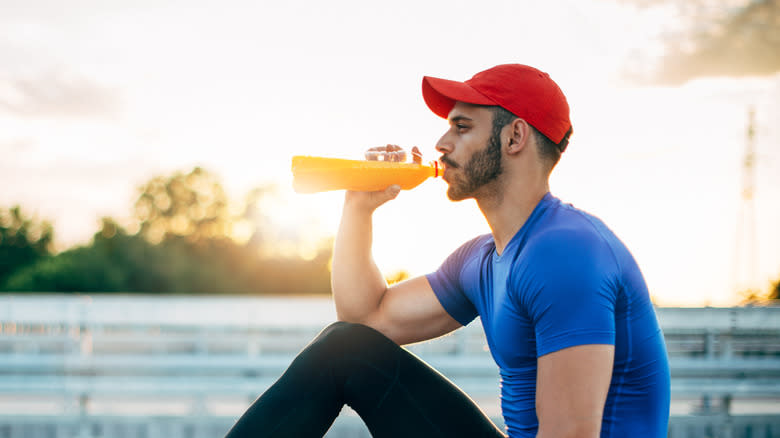
First and foremost, sports drinks are engineered to help rehydrate athletes after strenuous exercise, but the formulas can vary significantly from one brand to another. Some sports drinks, therefore, make for healthier choices than others. Plus, not all sports drink consumption follows physical activity intense enough to necessitate the ingredients included for rehydration, in which case healthiness -- or lack thereof -- becomes magnified.
The two main components of many leading sports drinks potentially beneficial after a high-cardio workout — but not always desirable for the average consumer — are sodium and sugar. Sodium is an electrolyte, so after losing fluids to sweat, a high dose can aid with rehydration. However, exceeding the FDA's daily recommended sodium intake, which can vary from person to person, carries health risks and can still occur after exercise. Sugar, meanwhile, can help muscles recover depleted glycogen post-workout. Similarly, however, the large quantities of sugar in some sports drinks can readily contribute to excessive sugar intake, even after strenuous exercise.
Salt and sugar aren't inherently bad — indulgences can still be part of a healthy diet, after all. But if you're looking to enjoy the benefits of sports drinks while still making health-conscious choices, here are 10 post-workout beverages you might want to avoid.
Read more: Diet Sodas, Ranked Worst To Best
1. Powerade
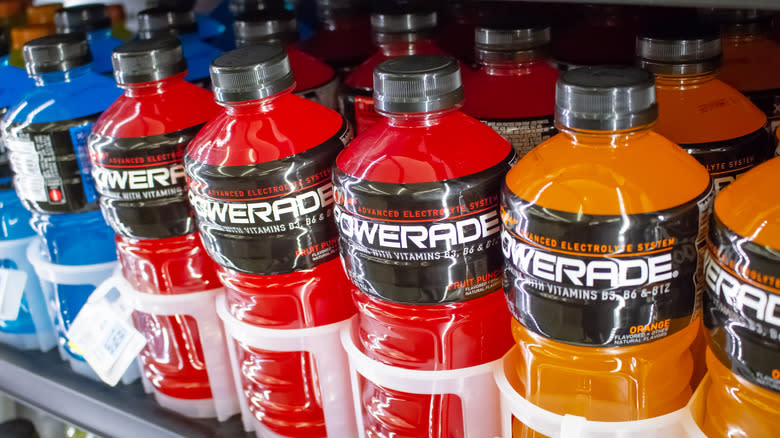
It's worth noting, Powerade can be a healthier choice than other competing soft drinks — a 28-fluid-ounce bottle of Powerade, for instance, contains less sugar and fewer overall calories than a 20-fluid-ounce bottle of Coca-Cola. Especially if it's not consumed after strenuous cardio, Powerade is close enough in nutritional content to Coca-Cola to warrant such a comparison.
A standard, 28-fluid-ounce bottle of Powerade contains 200 calories, 600 milligrams of sodium, and 52.5 grams of sugar. That same bottle of Coke, meanwhile, contains 240 calories and 65 grams of sugar. For what it's worth, the Powerade bottle's nutrition label claims 2.5 servings, but it's probably safe to say that the majority of Powerade bottles are not separated into two-and-a-half discrete portions.
Additional ingredients include electrolytes like magnesium and potassium, as well as vitamins C and B12, which could theoretically benefit someone with deficiencies in any of the above. But because of its particularly high levels of sodium and sugar — accounting for 25% and more than 100% of the FDA's recommended daily average intake respectively — Powerade lands at this list's number one spot as the single unhealthiest popular sports drink.
2. Gatorade
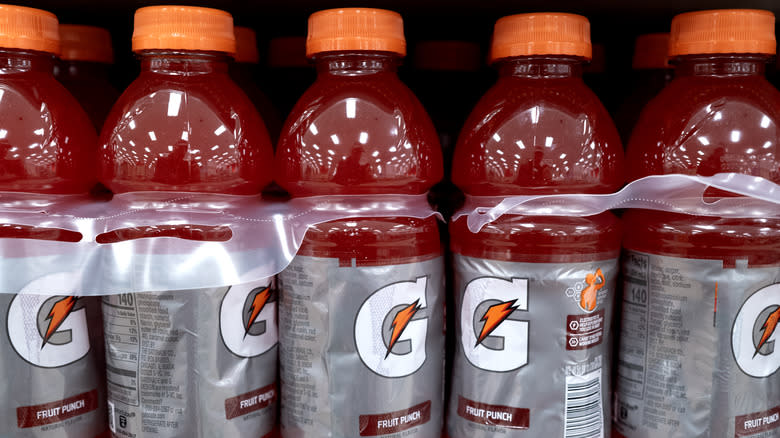
It may come as no surprise that landing at number two on this list is sports drink category leader, Gatorade. As the drink's proponents are surely aware, Gatorade can taste pretty great. That's undeniably a good thing for anyone looking for a treat, but not necessarily indicative of a healthy dietary choice.
One 28-fluid-ounce bottle of Gatorade contains 190 calories, 380 milligrams of sodium, and 48 grams of sugar. While these numbers are each lower — meaning in most contexts healthier — than the closest competitor Powerade, the one factor holding Gatorade back from a clean sweep in this regard is its lack of vitamins. A Gatorade bottle contains added potassium, but that's all.
On the flip side, Gatorade is sweetened with a combination of sugar and dextrose, as opposed to Powerade's high fructose corn syrup. According to a post on the official Harvard Medical School blog, however, differences between types of sugars are nominal and have little impact on health. Therefore, while customers might prefer the lack of high fructose corn syrup in Gatorade, its source of sugar is ultimately not a significant health factor.
3. Pedialyte Sport
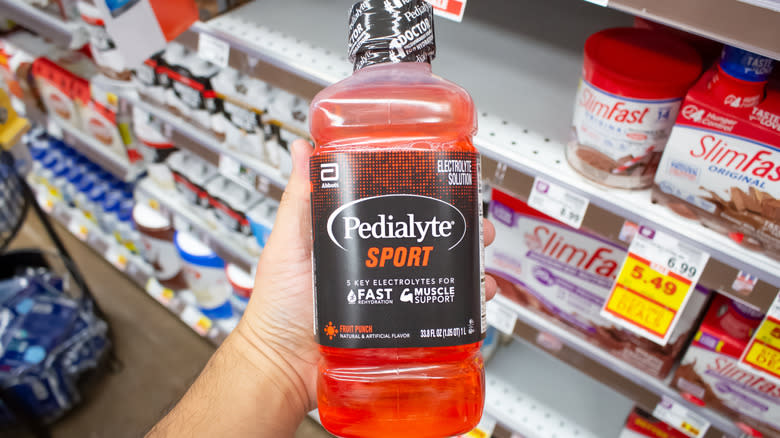
While the original Pedialyte formula is itself practically a sports drink, its advertised purpose is general hydration — for scenarios including sickness and travel — rather than sports hydration in particular. To compete in the sports drink sector, Pedialyte offers a variation on its standard formula with more sodium and less sugar called Pedialyte Sport.
What's unique about Pedialyte Sport compared to, say, a bottle of Gatorade, is that it's significantly lower in calories and sugar despite a regular bottle's higher volume. Its sodium content, however, is high enough to pose a risk in and of itself in situations other than a genuinely significant need for rehydration.
Numbers-wise, each 33.8 fluid ounce bottle of Pedialyte Sport contains 85 calories, 25 grams of carbs — 14 grams of which are from sugar — and 1,380 grams of sodium. That last number accounts for 60% of the FDA's recommended daily average intake. So, while Pedialyte Sport may serve a specific purpose, that large quantity of sodium means that consumption outside of its intended use makes for an unhealthy choice.
4. Ready Sports Drink
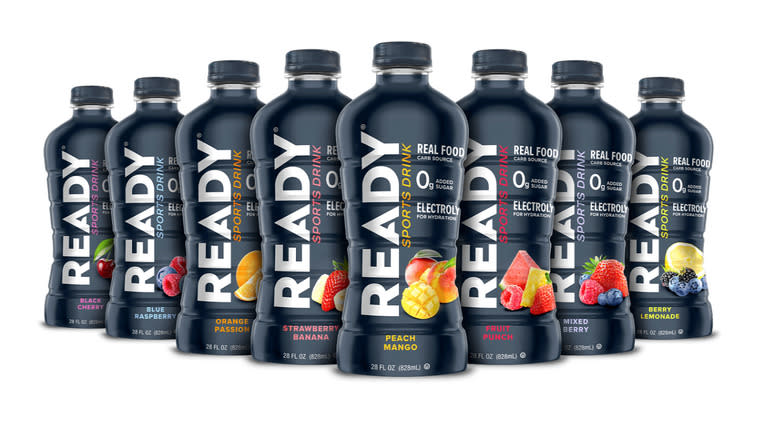
Ready is a relatively new player in the world of sports nutrition. Its origin dates back to 2012, and its ownership group includes big names in the world of sports like two-time NBA MVP Giannis Antetokounmpo and former NFL defensive star Aaron Donald. The company's sports drink offering, simply called Ready Sports Drink, advertises its "real food" content in big letters on each bottle in an apparent attempt to present it as a healthier alternative to its competitors.
While Ready Sports Drink may be a healthier choice than Gatorade and Powerade, it's still plenty sugary and includes a significant dose of sodium. Specifically, a 28-fluid-ounce bottle of Ready Sports Drink contains 170 calories, 420 milligrams of sodium, and 42 grams of carbs — 32 grams of which are from sugar. However, it's also rich in vitamins and minerals, including potassium as well as vitamins B3, B6, B9, and B12.
One notable way Ready Sports Drink is unique is that it contains no added sugar, its sweet taste instead comes from real fruit juice. Nevertheless, 32 grams of sugar — natural or not — is nearly comparable to the 39 grams of sugar content in a can of Coca-Cola. Between that real fruit juice and its added vitamins and minerals, Ready Sports Drink may be more nutritious than the average sports drink, but it's hard to argue that its nutritional benefits outweigh its heavy sugar content.
5. Walmart Great Value Sport
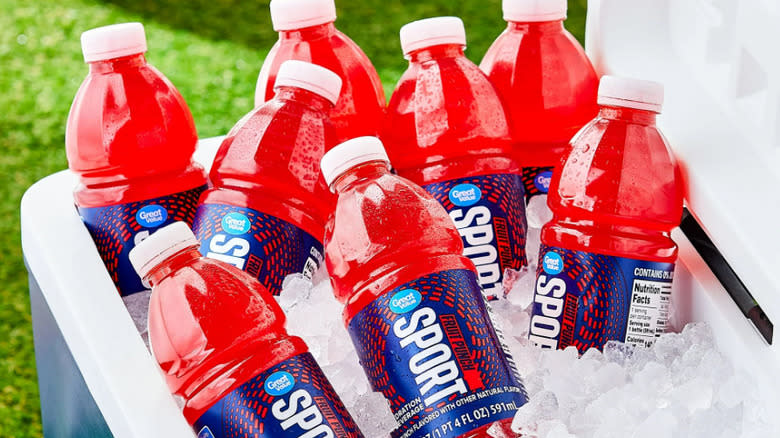
Walmart customers may prefer to opt for the megastore's proprietary Great Value brand sports drink over various alternatives simply due to its lower price point. All things considered, Walmart's Great Value Sport is also not quite as unhealthy as some of its closest competitors, but it's still high in sugar and not ideal for most diets.
Each bottle of Great Value Sport totals 140 calories, 270 grams of sodium, 33 grams of sugar, and 80 milligrams of potassium. It's worth noting that the standard Great Value Sport bottle size is a smaller-than-average 20 fluid ounces — but it's safe to assume most consumers are treating a full bottle of any given sports drink as a single serving, making metrics like sugar per fluid ounce not particularly relevant.
Great Value Sport can be considered less healthy than Ready Sports Drink — despite containing one more gram of sugar and lacking any real fruit juice — because the latter includes more calories, carbs, and sodium. That one gram of sugar is relatively negligible when the trade-off is 30 liquid calories, 150 grams of sodium, and 9 grams of carbs.
6. Electrolit
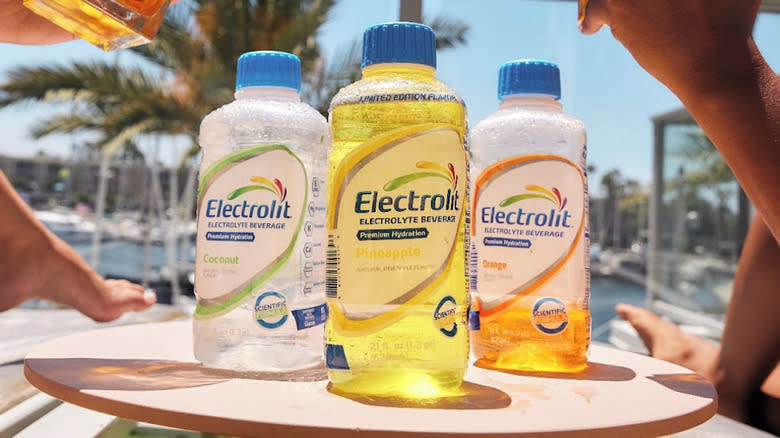
Visually, Electrolit more closely resembles Pedialyte than, say, the classic Gatorade bottle design or the comparatively more modern look of something like Ready Sports Drink. The Electrolit formula, however, is textbook when it comes to a sports drink.
Each 21-fluid-ounce bottle of Electrolit includes 130 calories, 430 milligrams of sodium, and 31 grams of sugar. Supplementary ingredients include potassium, calcium, and magnesium. Despite its branding simply mentioning hydration and not athletics specifically, it's very much a sports drink in practice.
The reason it can be considered healthier than Walmart's Great Value Sport is that — despite a higher level of sodium — it contains 10 fewer calories, 2 grams less of sugar, and more supplementary ingredients that could be beneficial in a diet lacking in vitamins and minerals. Compared to Ready Sports Drink, meanwhile, Electrolit contains 40 fewer calories, a nearly equivalent level of sodium, 1 gram less of sugar, and fewer carbs.
7. Bodyarmor SuperDrink
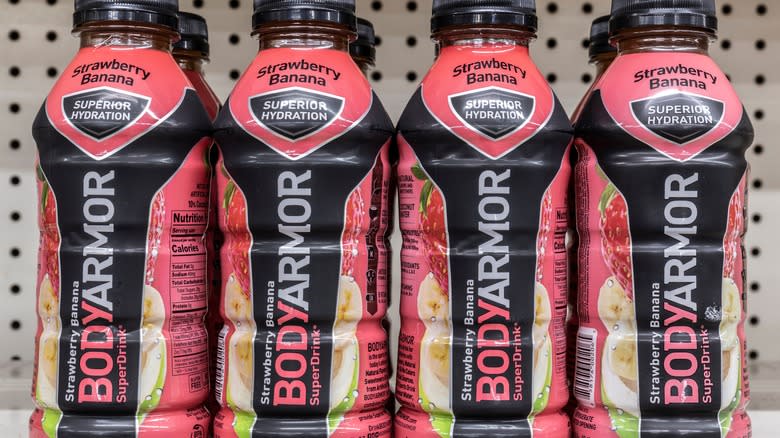
Bodyarmor sports drink — technically styled as Bodyarmor SuperDrink — has become one of the most popular sports drink brands, competing with only Gatorade and even overtaking its closest rival in some online rankings like Amazon's list of best-sellers.
While Bodyarmor is owned by the Coca-Cola Company, competing in-house against the Coca-Cola-owned Powerade, the former is significantly healthier than the latter. A 16-fluid-ounce bottle of Bodyarmor contains 120 calories, 30 milligrams of sodium, and 29 grams of sugar. While that sugar content may not be ideal, it's the lack of excess sodium that helps make Bodyarmor a relatively healthier choice than many other non-diet sports drinks. Instead of a large serving of sodium, its electrolyte content comes primarily from a healthy dose of potassium — in part due to its coconut water concentrate, listed as its third ingredient. Also added to the Bodyarmor formula are zinc oxide, vitamin A, vitamin C, vitamin E, and various B vitamins.
8. Vitaminwater
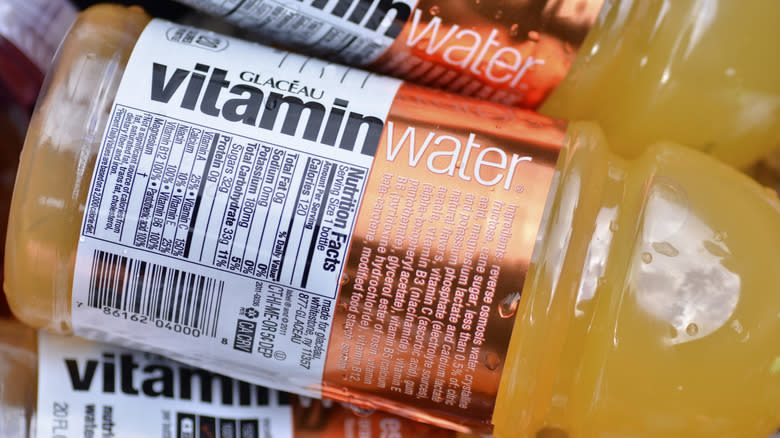
Vitaminwater isn't strictly a sports drink. Rather, its outer label claims that it is a "nutrient enhanced water beverage," and spotlights its antioxidant content. Even if it's positioning itself as a flavored water, however, the Vitaminwater formula includes added electrolytes, making it well suited to athletic recovery all the same.
Each 20-fluid-ounce bottle of Vitaminwater contains 100 calories, 26 grams of sugar, and zero sodium content. That's supplemented with vitamin A, vitamin C, and four B vitamins, in addition to magnesium, calcium, and potassium. Like most of its closest competitors, Vitaminwater isn't altogether a dietarily healthy choice — the fact it once purported itself to be served as the basis for a lawsuit, after all. Nevertheless, due to its lack of sodium, lower-than-average sugar content for a non-diet sports drink, and significant vitamin content, there are at least a handful of unhealthier sports drink options on the market than a bottle of Vitaminwater.
9. Hoist
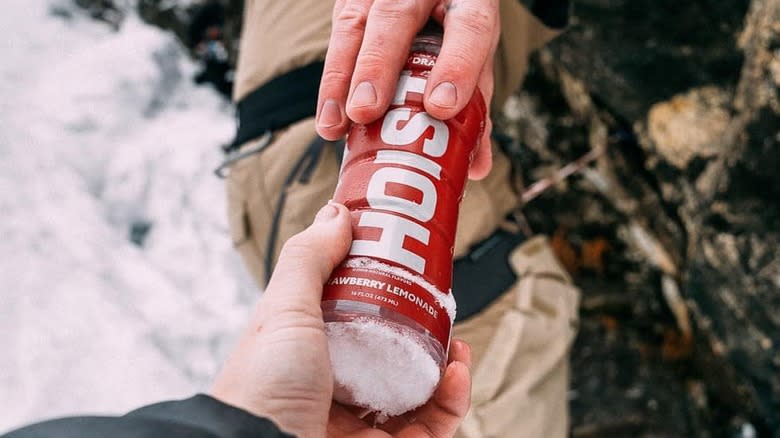
One factor that makes Hoist stand out in the growing sports drink industry is its relationship with the U.S. military. Dieticians who work for the Department of Defense decided that Hoist could be on a short list of sports drinks officially approved for hydrating soldiers. As a result, it's stocked at just over 90% of U.S. bases worldwide.
Perhaps key to the unique formulation that earned the drink approval from the Department of Defense over many of its competitors is a recipe that prioritizes electrolytes over sugar content. A 16-fluid-ounce bottle of Hoist contains 70 calories, 430 milligrams of sodium, and 14 grams of carbs — 13 grams of which come from sugar. Supplementary electrolytes include calcium, potassium, and magnesium.
While 430 milligrams of sodium is approximately 19% of the FDA's daily recommended intake. With 13 grams of sugar less than Vitaminwater, the sugar content of Hoist accounts for just over 25% of the FDA's daily recommended 50 grams. Hoist's hydration-focused formula is a solid sports drink choice so long as healthfulness is a priority — but it is worth noting it contains cane sugar and dextrose. Plenty of diet sports drinks on the market lack sugar altogether and arguably make for a better choice in a case where healthiness takes precedence over the potential for aiding in sports recovery.
10. Powerade Zero
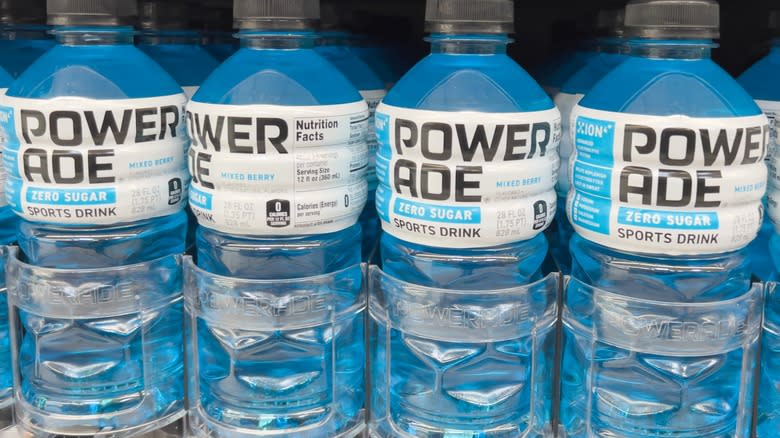
After Hoist, many of the most popular sports drinks are explicitly diet-focused or otherwise lack real sugar. Logan Paul's controversial Prime, for example, contains 2 grams of sugar and lacks added sugar content. Of course, some diet sports drinks are healthier than others, and Powerade Zero is the foremost example of a diet option that's arguably not a healthy choice overall.
The Powerade Zero formula contains 600 milligrams of sodium per 28-fluid-ounce bottle. Added supplements include calcium, potassium, magnesium, vitamin C, and vitamin B12. While Powerade Zero may lack sugar, its sodium content accounts for approximately a quarter of what the FDA recommends per day. Even this particular diet option could push someone with a diet otherwise high in salt into excessive sodium consumption.
It's also worth noting that Powerade Zero is sweetened with sucralose. While the FDA has determined sucralose to be safe, certain qualities of the artificial sweetener arguably warrant further study. Both avoiding sucralose and preferring it to regular sugar are justifiable mindsets for different reasons. While it's unclear if Powerade Zero's sucralose content affects its healthfulness, it's a factor that could impact someone's opinion of the drink all the same.
Methodology
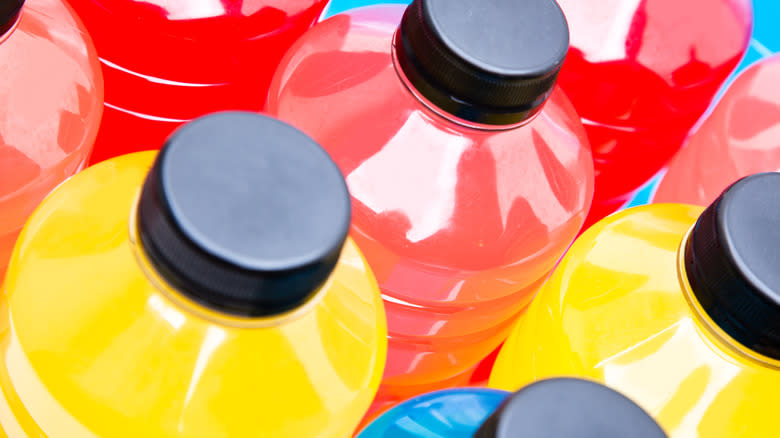
The most important factor used to determine this ranking of popular sports drinks by unhealthiness was the nutritional facts label of each item. Specifically — in order of importance — total sugar, sodium, and calories were the most relevant metrics since sports drinks typically don't contain fat or cholesterol.
Sugar carried the most weight because of how significantly even just a few grams of sugar can contribute to exceeding the FDA's daily recommended dose of 50 grams. The high sodium content in many sports drinks can likewise contribute to excessive consumption, but also readily helps with hydration. Theoretically, sugar can aid with muscle recovery, but in the sorts of high-cardio situations for which sports drinks are typically intended, hydration is arguably more important than refueling muscles' glycogen stores. Calories are a factor, meanwhile, because of how readily liquid calories can impact excessive caloric consumption. Finally, vitamin and mineral content was worth noting for potential health benefits, but never swayed a decision one way or another single-handedly.
Read the original article on Mashed

